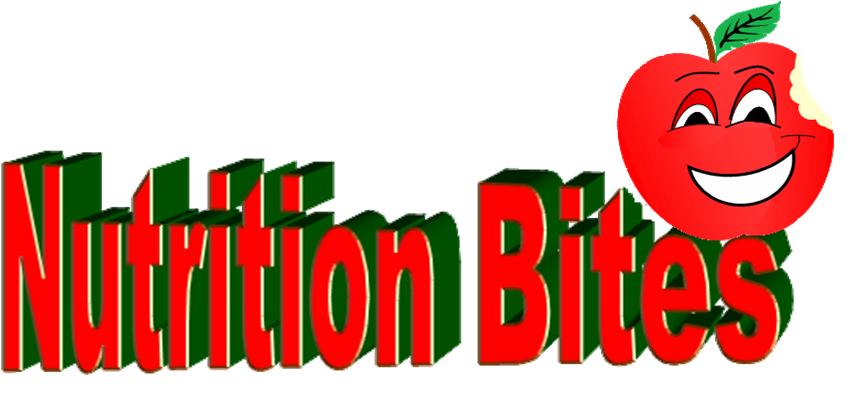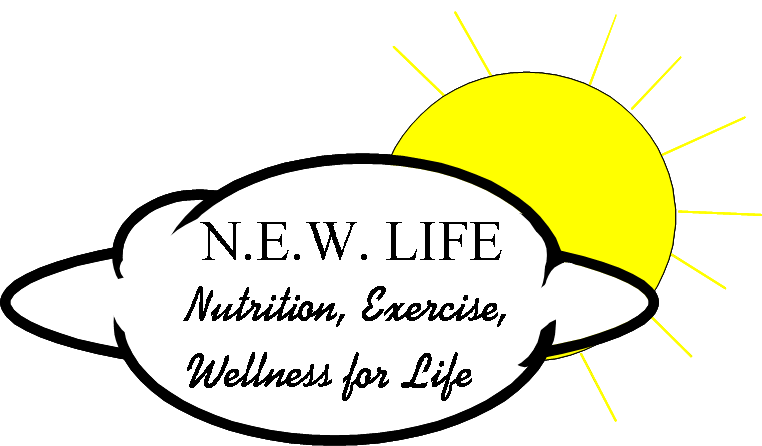[Home]
[About N.E.W. LIFE]
[What's an R.D.?]
[Nutrition Bites]
[The Seed (Blog)]
[Class Schedules]
[Online Classes]
[Individual Counseling]
[Food Diary Evaluations]
[Nutrition Seminars]
[Dietitian's Page]
[Resources]
[Class Resources (Login/Logout)]
[About N.E.W. LIFE]
[What's an R.D.?]
[Nutrition Bites]
[The Seed (Blog)]
[Class Schedules]
[Online Classes]
[Individual Counseling]
[Food Diary Evaluations]
[Nutrition Seminars]
[Dietitian's Page]
[Resources]
[Class Resources (Login/Logout)]
N.E.W. LIFE Principle:
Overwhelming evidence in nutrition research indicates that preventing disease is more an issue of what we do eat than what we don't. In other words, are you eating enough fruits, vegees, whole grains, beans, nuts, seeds, etc. with the 100's of health-supporting vitamins, minerals, phytochemicals, fiber, and other "food factors" to prevent disease?
Americans are so focused on "cutting out" the fat, saturated fat, cholesterol, sugar, etc. (an ineffective way of producing permanent behavior change is to focus on what not to do!)
Focus on putting in what is missing. Can you add one more fruit or vegee to your diet today? If you are you doing well with fruits and vegees, but lack beans (3x/week) or fish (2-4x/week), can you add one bean or fish meal this week? You will begin to contribute significant nutrients to your diet and likely experience a change in desires (surprisingly quickly for most N.E.W. LIFE program participants, and not with any "all-or-nothing" diet!
Americans are so focused on "cutting out" the fat, saturated fat, cholesterol, sugar, etc. (an ineffective way of producing permanent behavior change is to focus on what not to do!)
Focus on putting in what is missing. Can you add one more fruit or vegee to your diet today? If you are you doing well with fruits and vegees, but lack beans (3x/week) or fish (2-4x/week), can you add one bean or fish meal this week? You will begin to contribute significant nutrients to your diet and likely experience a change in desires (surprisingly quickly for most N.E.W. LIFE program participants, and not with any "all-or-nothing" diet!
And that results in effective, lifelong behavior change.
N.E.W. LIFE Principle:
What has always been, still is, and always will be an "optimal diet".
N.E.W. LIFE Principle:
What has always been, still is, and always will be an "optimal diet".
It is only our understanding of nutrition that is changing. There has been so much conflicting information, some of it coming from the legitimate nature of investigating a question you do not know the answer to (that's research). "Pieces" of the big-picture-answer are revealed that initially may be interpreted somewhat out-of-context. But with time, and with solid and consistent investigation, confounding variables can be ruled out and the truth become clear. That is legitimate contradictory information, and I just wish that reporters and book authors would have respect for the process and would stop publishing new "facts" too early or out-of-context.
While nutrition research has proven to be very valuable to the investigation and contribution to our understanding of nutrition, epidemiological research remains the "gold standard". What we should have been doing all along was what researchers have begun doing since the 1960's--verifying our nutrition research conclusions (investigated in the 4 walls of our American labs, often coming to the investigation with our American biases) with the BIG nutrition lab in the world--healthy cultures around the world. Even the American experts in nutrition are now putting down the initial American biases and "tweaking" the American public health/dietary recommendations every year to the axiom which N.E.W. LIFE upholds: more plant, less animal. Our public health dietary recommendations are looking more "Mediterranean" each year. For example, the Year 2000 Dietary Guidelines for Americans represent this "new" thinking with much greater emphasis on plant foods (they went from the previous 7 Dietary Guidelines to 10 with the added emphasis on making the "grain recommendation" separate from fruits and vegetables, also emphasizing a "variety of grains, especially whole grains") and a diet low in saturated fat and moderate (not low!) in total fat. The trend continued in the 2005 Dietary Guidelines for Americans. Similarly, the very effective D.A.S.H. Diet (Dietary Approaches to Stop Hypertension) for lowering high blood pressure recommends daily intakes of 7-8 starches, 8-10 fruits and vegees, a reduction in meat and dairy fats (and a reduction in meat servings), and 4-5 servings of nuts and beans weekly. The American Heart Association also "tweaked" its recommendation wording in 2000 to reflect the evidence which indicates that the higher 30% recommendation is actually a good level of fat if the diet is based on healthy fats (the AHA recommendation is now "no more than 30% calories from fat" instead of the 20% calories from fat and 30% or less calories from fat previously recommended. The National Cholesterol Education Program/NIH Adult Treatment Panel III report 2001 has increased the fat recommendation from the previously issued Step I and II "Cholesterol-Lowering Diets" which recommended 30% fat and 20% fat, respectively, to 25-35% fat with a decrease in saturated and trans fats and an emphasis on monounsaturated fat (up to 20%) and complex carbohydrates. Just watch the "tweaking" that continues in the recommendations. You can be confident of this--an optimal diet is NOT going to change.
But there is another cause of contradictions and confusion in nutrition information which I am more concerned about than that which arises out of legitimate research. Confusion which comes not from the scientific process, but from "theories" being presented as if they were fact, and philosophical agendas being intertwined ever-so-subtly but amazingly boldly in the popular nutrition books. One of the original popular high-protein diet book authors espoused the philosophy that we are evolving to some greater level of species, and that we need to accommodate our "eeiconosoids" to achieve optimal health. I would have to argue with the idea that we are evolving to some greater level of humanity (that should be evident from watching the news) with needs for "eiconosoids" (or the biochemical degree to understand them in order to eat right).
Another popular diet book author is convinced (and convincing to a large readership) that we must "type" our diet to our blood, the match for optimal nutrition determined from "humanoid" lines hundreds of millions of years ago. He sounds so confident of what "happened"! This author also suggests we have "developed such acute intelligence" (also questionable) in line with the developing superspecies philosophy.
While nutrition research has proven to be very valuable to the investigation and contribution to our understanding of nutrition, epidemiological research remains the "gold standard". What we should have been doing all along was what researchers have begun doing since the 1960's--verifying our nutrition research conclusions (investigated in the 4 walls of our American labs, often coming to the investigation with our American biases) with the BIG nutrition lab in the world--healthy cultures around the world. Even the American experts in nutrition are now putting down the initial American biases and "tweaking" the American public health/dietary recommendations every year to the axiom which N.E.W. LIFE upholds: more plant, less animal. Our public health dietary recommendations are looking more "Mediterranean" each year. For example, the Year 2000 Dietary Guidelines for Americans represent this "new" thinking with much greater emphasis on plant foods (they went from the previous 7 Dietary Guidelines to 10 with the added emphasis on making the "grain recommendation" separate from fruits and vegetables, also emphasizing a "variety of grains, especially whole grains") and a diet low in saturated fat and moderate (not low!) in total fat. The trend continued in the 2005 Dietary Guidelines for Americans. Similarly, the very effective D.A.S.H. Diet (Dietary Approaches to Stop Hypertension) for lowering high blood pressure recommends daily intakes of 7-8 starches, 8-10 fruits and vegees, a reduction in meat and dairy fats (and a reduction in meat servings), and 4-5 servings of nuts and beans weekly. The American Heart Association also "tweaked" its recommendation wording in 2000 to reflect the evidence which indicates that the higher 30% recommendation is actually a good level of fat if the diet is based on healthy fats (the AHA recommendation is now "no more than 30% calories from fat" instead of the 20% calories from fat and 30% or less calories from fat previously recommended. The National Cholesterol Education Program/NIH Adult Treatment Panel III report 2001 has increased the fat recommendation from the previously issued Step I and II "Cholesterol-Lowering Diets" which recommended 30% fat and 20% fat, respectively, to 25-35% fat with a decrease in saturated and trans fats and an emphasis on monounsaturated fat (up to 20%) and complex carbohydrates. Just watch the "tweaking" that continues in the recommendations. You can be confident of this--an optimal diet is NOT going to change.
But there is another cause of contradictions and confusion in nutrition information which I am more concerned about than that which arises out of legitimate research. Confusion which comes not from the scientific process, but from "theories" being presented as if they were fact, and philosophical agendas being intertwined ever-so-subtly but amazingly boldly in the popular nutrition books. One of the original popular high-protein diet book authors espoused the philosophy that we are evolving to some greater level of species, and that we need to accommodate our "eeiconosoids" to achieve optimal health. I would have to argue with the idea that we are evolving to some greater level of humanity (that should be evident from watching the news) with needs for "eiconosoids" (or the biochemical degree to understand them in order to eat right).
Another popular diet book author is convinced (and convincing to a large readership) that we must "type" our diet to our blood, the match for optimal nutrition determined from "humanoid" lines hundreds of millions of years ago. He sounds so confident of what "happened"! This author also suggests we have "developed such acute intelligence" (also questionable) in line with the developing superspecies philosophy.


